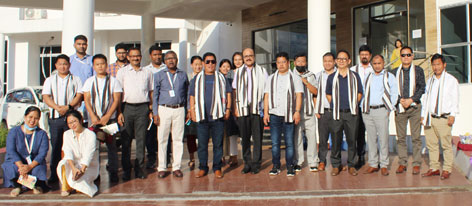KIMIN, 8 May: Arunachal Pradesh State Council for Science & Technology (APSCS&T) Chairman Bamang Mangha on Sunday lauded the APSCS&T’s Centre of Excellence (CoE) for Bioresources & Sustainable Development here in Papum Pare district.
Chairing a review meeting with APSCS&T Director CD Mungyak, Centre for Earth Sciences & Himalayan Studies Director Tana Tage, CoE Director Dr Debajit Mahanata, and others, the chairman exhorted the scientists to “embark upon research activities that can have more societal benefits and help the state to boost up economy of the state through natural resources.”
“Arunachal Pradesh is bestowed with vast natural resources, which could not be tapped due to lack of scientific interventions,” he said, adding that the state government needs to focus more on science-based research activities “to take the state on the path of self-sustenance.”
Science & Technology Secretary Ajay Chagti told the participating delegates from the finance, planning, and law departments that the CoE’s “world-class infrastructure” needs to be “sustained, for which support of state government is called for.”
Deputy Law Secretary Dani Belo stressed on “tackling bio-piracy, which is taking place across the world,” adding that, otherwise the state’s natural resources would be exploited by unauthorised parties. “We are lucky to have this centre of excellence in our state, which is taking care of our resources,” he said.
Deputy Finance Secretary Takhe Kani also spoke.
Joint Planning Director Okep Tayeng suggested to the department to “take up more international and national collaboration projects in the field of biotechnology that can really help the state government to generate more avenues for the youths, farmers and entrepreneurs,” while Dr Mahanta made a presentation on the CoE’s achievements in the last three years. He said that the centre has a state-of-the-art orchidarium “for conservation and multiplication of priority orchid species, along with its satellite units in villages, with a view to promote orchid-based entrepreneurship in rural areas of Arunachal Pradesh.”
“Apart from this, the department is engaging banana fibre extraction and processing through units which were set up in a few selected districts of Arunachal Pradesh,” he said, adding that “more than 100 beneficiaries have been selected, based on interviews and availability of land for banana cultivation, and more than 3,000 banana saplings have been distributed to the beneficiaries for cultivation.”
The department has also established a distillation unit for aromatic oil to promote cultivation of aromatic crops such as lemongrass, citronella, palmarosa, etc.
The department is also working on bio-prospecting and translational product development research on medicinal aromatic foam forming plant resources of Arunachal. It has also conducted ethno-pharmacological survey, documentation of traditional knowledge, plant collection and scientific validation. “The expected outcome in the form of tablets will be helpful for treating diseases such as superficial fungal infections, hypertension, tonsillitis, liver ailments, antiseptic cream, lungs disorder, etc,” the department informed in a release.
“The department also has its exploration, collection and documentation of 16 rice varieties from Ziro, Lower Subansiri, having phytochemical properties, nutritional value and antioxidants,” the release added.
“Towards protecting the endangered local rice varieties, the department has collected 126 traditional rice landrace samples for germplasm registration and accession numbers with NBPGR, New Delhi, from Papum Pare, Kurung Kumey, Kra Daadi, Upper Siang, East Siang, Lower Subansiri and East Kameng districts,” it added.

